Updated July 1, 2023
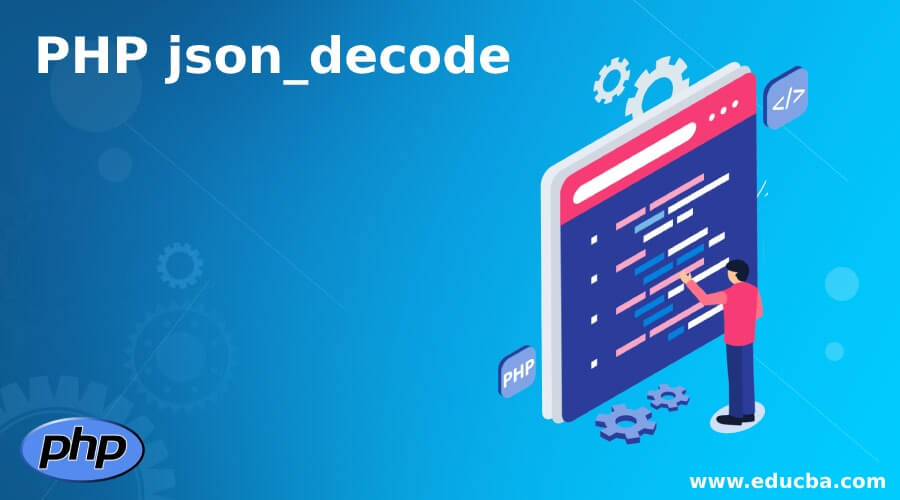
Introduction to PHP json_decode
In PHP, the inbuilt function json_decode() function is defined as a function; as its name suggests it is a function for conversion of any JSON a standard text format objects or decoding of JSON objects to PHP objects, taking a JSON string as a parameter which this function converts or decodes it and returns the encoded values which were in JSON into proper PHP objects. The PHP generally provides a function that takes a JSON string that usually represents a javascript array or object literals for converting this encoded string in JSON format to a particular PHP object data type.
Working of Json_decode() in PHP
In this article, json_decode() is an inbuilt function provided by PHP for converting or decoding the JSON string into PHP objects. In PHP, the json_decode() function decodes a JSON string and converts it into PHP objects or data types. It takes the JSON data as a parameter and returns the corresponding PHP representation.
In the below section, we will see syntax and examples of using the json_decode() function:
Syntax:
json_decode(json_string, asso_arr, recur_depth, opt)Parameters:
Json_string: this parameter is compulsory to specify the JSON-encoded string for converting it into PHP objects
- Asso_arr: this parameter is used to specify the Boolean values that can return an associated array if the value is set to true, else returns an object if it is set to false. This parameter is optional and has false as the default value.
- Recur_depth: this parameter is used to specify the depth of the recursion, and this is also an optional parameter with 512 as a default value.
- Opt: this parameter is used to specify the bitmask of JSON_OBJECT_AS_ARRAY, JSON_BIGINT_AS_STRING, JSON_INVALID_UTF8_SUBSTITUTE,, JSON_THROW_ON_ERROR and this is also an optional parameter.
Now let us see a simple example that uses json_decode() of PHP in an HTML structure.
Examples of PHP json_decode
Following are the examples are given below:
Example #1
Code:
<!DOCTYPE html>
<html lang="en">
<head>
<title>Educba- PHP json_decode</title>
</head>
<body>
<?php
$json_string = '{
"CompayName": "Educba",
"Director": "Snehal",
"Employee": "Amardeep",
"address": {
"ColonyName": "Shivaji road",
"city": "Baramati",
"state": "Maharashtra",
"postalCode": "1234567"
},
"TelephoneNumbers": [
{ "type": "Work", "phonenumber": "9876543210" }
]
}';
var_dump(json_decode($json_string, true));
?>
</body>
</html>Output:

In the above program, we can see when we are writing PHP code in HTML structure; we start with “< ?php”, then we write the code, and at the end, the closing tag for PHP code is “? >”. It has an array(5), which means it has 5 elements in an array. Suppose we have not set anything or have not passed the asso_arr parameter such as “var_dump(json_decode($json_string));” then this value would give us access to the property of the object in an array as shown in the below screenshot.
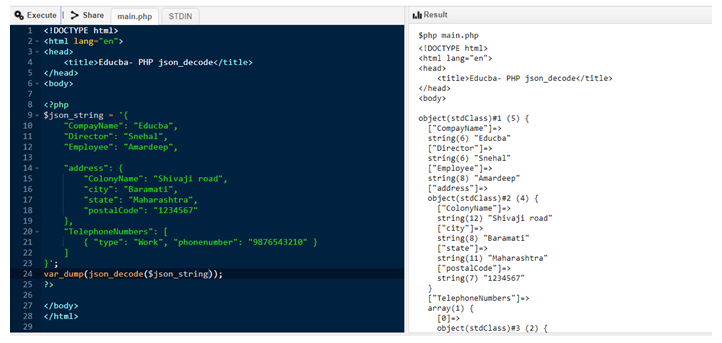
Now we will see an example below: an invalid JSON format and passing this string to the json_decode() function and what error and output it will give. We will also see how to print those arrays, which can be accessed using the “echo” function in the below section.
Example #2
In the below program, we will see how to access an element of an array using the echo function.
Code:
<!DOCTYPE html>
<html lang="en">
<head>
<title>Educba- PHP json_decode</title>
</head>
<body>
<?php
$json_string = '[
{
"Companyname": "Educba",
"Director": "Snehal",
"phnumber": "89945954874"
},
{
"Companyname": "Google",
"Director": "Ann",
"phnumber": "9877564694"
}
]';
$x = json_decode($json_string);
echo $x[0]->Companyname;
?>
</body>
</html>Output:
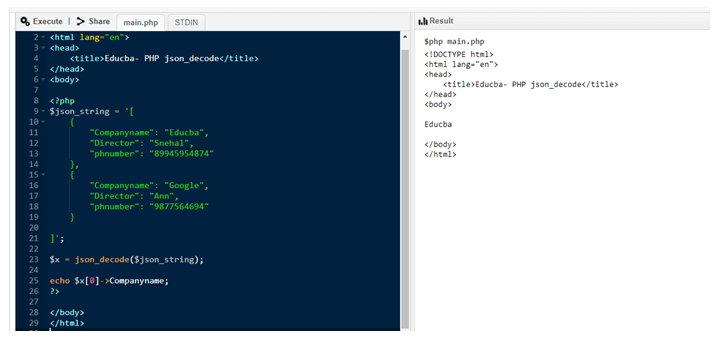
In the above program, we can see when we have declared a json_string and accessed any of the elements in the array; we use array[index] in any programming language. similarly, we write it with the echo function, and in the above code, we have to observe that we have not passed the asso_arr parameter in the json_decode() function, so to access the element, we have to write “echo $x[0]-> Companyname;” and if we set the second parameter to “true” then we have to write “echo $x[0][‘Companyname’];”.
Example #3
In the below, we will see passing an invalid JSON string to the function and try printing the errors also.
Code:
<!DOCTYPE html>
<html lang="en">
<head>
<title>Educba- PHP json_decode</title>
</head>
<body>
<?php
$json_string = '[
{
"Companyname": "Educba"
"Director": "Snehal"
"phnumber": "89945954874"
"Companyname": "Google"
"Director": "Ann"
"phnumber": "9877564694"
}
]';
$x = json_decode($json_string);
echo $x[0]->Companyname;
echo json_last_error();
echo json_last_error_msg();
?>
</body>
</html>Output:
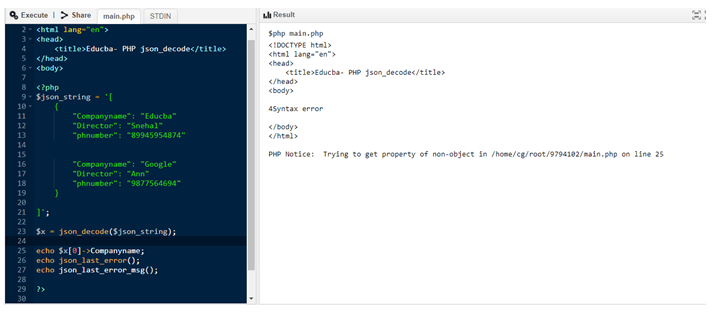
We print the error information, such as “4 syntax errors,” using the json_last_error() and json_last_error_msg() functions. These functions provide details about the errors related to the PHP code written in the example above. If we don’t want to print any error messages using the error functions, the output will be “null,” indicating that the converted PHP objects or the JSON data itself are invalid.
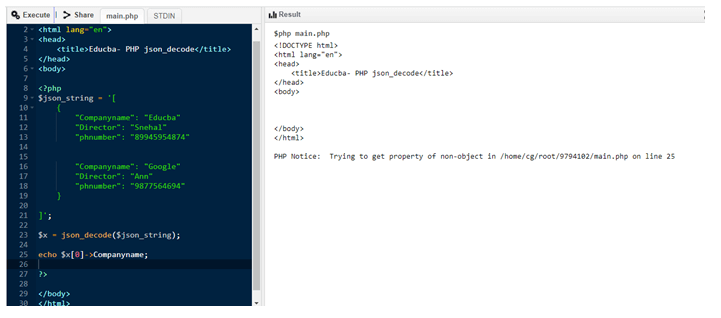
Recommended Articles
This is a guide to PHP json_decode. Here we also discuss the introduction and working of json_decode() in PHP, along with different examples and its code implementation. You may also have a look at the following articles to learn more –


